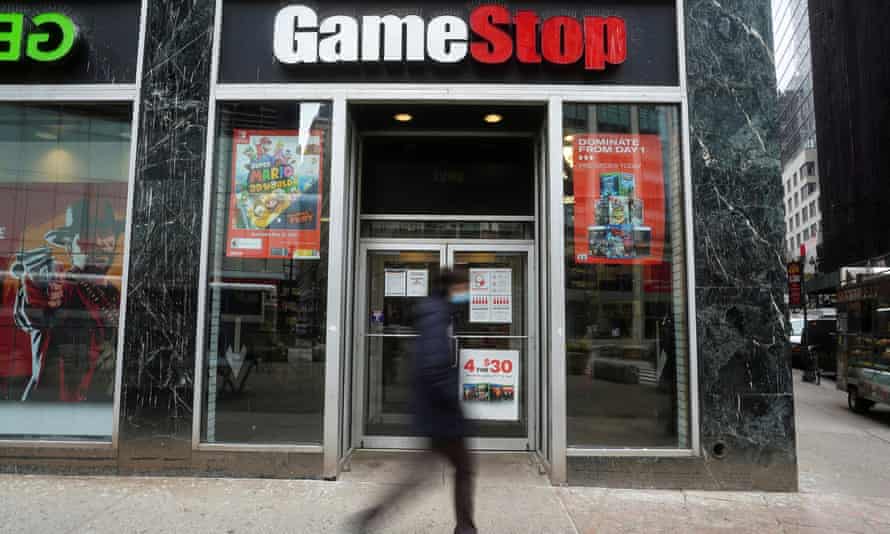
Towards the end of 1636, there was an outbreak of bubonic plague in the Netherlands. The concept of a lockdown was not really established at the time, but merchant trade slowed to a trickle. Idle young men in the town of Haarlem gathered in taverns, and looked for amusement in one of the few commodities still trading – contracts for the delivery of flower bulbs the following spring. What ensued is often regarded as the first financial bubble in recorded history – the “tulip mania”.
Nearly 400 years later, something similar has happened in the US stock market. This week, the share price of a company called GameStop – an unexceptional retailer that appears to have been surprised and confused by the whole episode – became the battleground between some of the biggest names in finance and a few hundred bored (mostly) bros exchanging messages on the WallStreetBets forum, part of the sprawling discussion site Reddit.
The rubble is still bouncing in this particular episode, but the broad shape of what’s happened is not unfamiliar. Reasoning that a business model based on selling video game DVDs through shopping malls might not have very bright prospects, several of New York’s finest hedge funds bet against GameStop’s share price. The Reddit crowd appears to have decided that this was unfair and that they should fight back on behalf of gamers. They took the opposite side of the trade and pushed the price up, using derivatives and brokerage credit in surprisingly sophisticated ways to maximise their firepower.
To everyone’s surprise, the crowd won; the hedge funds’ risk management processes kicked in, and they were forced to buy back their negative positions, pushing the price even higher. But the stock exchanges have always frowned on this sort of concerted action, and on the use of leverage to manipulate the market. The sheer volume of orders had also grown well beyond the capacity of the small, fee-free brokerages favoured by the WallStreetBets crowd. Credit lines were pulled, accounts were frozen and the retail crowd were forced to sell; yesterday the price gave back a large proportion of its gains.
To people who know a lot about stock exchange regulation and securities settlement, this outcome was quite inevitable – it’s part of the reason why things like this don’t happen every day. To a lot of American Redditors, though, it was a surprising introduction to the complexity of financial markets, taking place in circumstances almost perfectly designed to convince them that the system is rigged for the benefit of big money.
Corners, bear raids and squeezes, in the industry jargon, have been around for as long as stock markets – in fact, as British hedge fund legend Paul Marshall points out in his book Ten and a Half Lessons From Experience something very similar happened last year at the start of the coronavirus lockdown, centred on a suddenly unemployed sports bookmaker called Dave Portnoy. But the GameStop affair exhibits some surprising new features.
Most importantly, it was a largely self-organising phenomenon. For most of stock market history, orchestrating a pool of people to manipulate markets has been something only the most skilful could achieve. Some of the finest buildings in New York were erected on the proceeds of this rare talent, before it was made illegal. The idea that such a pool could coalesce so quickly and without any obvious sign of a single controlling mind is brand new and ought to worry us a bit.
And although some of the claims made by contributors to WallStreetBets that they represent the masses aren’t very convincing – although small by hedge fund standards, many of them appear to have five-figure sums to invest – it’s unfamiliar to say the least to see a pool motivated by rage or other emotions as opposed to the straightforward desire to make money. Just as air traffic regulation is based on the assumption that the planes are trying not to crash into one another, financial regulation is based on the assumption that people are trying to make money for themselves, not to destroy it for other people.
When I think about market regulation, I’m always reminded of a saying of Édouard Herriot, the former mayor of Lyon. He said that local government was like an andouillette sausage; it had to stink a little bit of shit, but not too much. Financial markets aren’t video games, they aren’t democratic and small investors aren’t the backbone of capitalism. They’re nasty places with extremely complicated rules, which only work to the extent that the people involved in them trust one another. Speculation is genuinely necessary on a stock market – without it, you could be waiting days for someone to take up your offer when you wanted to buy or sell shares. But it’s a necessary evil, and it needs to be limited. It’s a shame that the Redditors found this out the hard way.